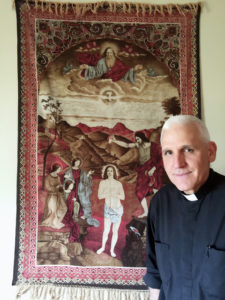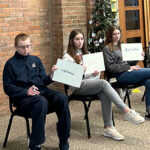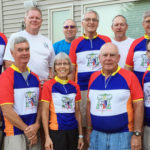By Fr. Bill Kneemiller
For The Catholic Messenger
Jordan is the land of the Ammonites and Moabites, Mount Nebo, the site of Moses’ only view of the Holy Land — and my favorite — the Jordan River holy sites.

Father William Kneemiller stands in front of a tapestry from Jordan that he brought back to the United States after one of his tours as a military chaplain overseas.
The military base on my last tour this year was only one hour away from the well-documented site to Jesus’ baptism, so my chaplain assistant and I took a Saturday morale trip to this holy place. Once at the Jordan River, I invited everyone in our group to renew their baptismal promises as we were at the edge of the Jordan “River.” The reason for the quotation marks is that the width of the Jordan has narrowed from an estimated 250-300 feet to about 25 feet. I marveled that we were so close to Israel.
The Protestant chaplain baptized some soldiers; Iraqi Christians also happened to be there. The Iraqi Christians mentioned that they are Orthodox Christians; on the Israel side other Orthodox Christians were chanting their baptismal promises. The Iraqis on the Jordan side joined in the responses. I thought, “There is hope for unity!” We were all deeply moved by being at the historic spot of Jesus’ baptism. Several ancient ruins close by attested to the spot where this holy exchange occurred between Jesus and John the Baptist, the Prophet of the Messiah!
From the baptismal site, I visited Ammon, the capital of Jordan. It was Sunday night and the Catholic group here traveled to downtown Ammon to go to Mass at the Jesuit Mission church. We were greeted again by Iraqi Christians, refugees from Mosul (Ancient Nineveh mentioned in the Book of Jonah).
Again, I was deeply moved to see the joy of these Chaldean Christians, one of the most ancient rites of our Catholic faith. The Mass was in the universal language, English. After the Mass I told the pastor, a Boston Jesuit, that I’d like to give these refugees a little piece of the Holy Land, the Holy Land Military Rosary, which has an olive-wood crucifix from Bethlehem. The pastor, a Father Linden, said the refugees would deeply appreciate this gift.
From the roof top of the Jesuit rectory we caught a glimpse of the Citadel, the fortress of the Ammonites at the time of King David. It was at this very spot that Uriah the Hittite was killed while King David was back in Jerusalem courting Uriah’s wife. I mentioned this to the soldiers because we were only minutes from this historic site, and the same events from 3,000 years ago are still very real temptations. I offered the sacrament of reconciliation before and after each Mass. I appreciate and understand that this sacrament is a sacrament of healing.
To conclude, my travel to the Jordan River was very much a tour of one of the lands of the Bible, and a great complement to my studies in Israel during my seminary days.
(Fr. Bill Kneemiller, chaplain of the Kahl Home in Davenport, completed his deployment as a military chaplain in the Holy Land this past spring).











